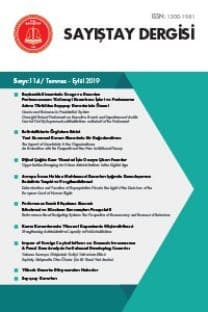Importance of strengthening communication capacity of sais for ensuring good governance in public financial management
Importance of strengthening communication capacity of sais for ensuring good governance in public financial management
Communication is one of the most essential tools for any organization in achievement of its objectives. In the age of knowledge, the key to accessing and harnessing knowledge lies in the ability to communicate. As supreme audit bodies of each country, Supreme Audit Institutions (SAIs) need to improve their communication capacities to achieve their objectives effectively and enhance their legitimacy. Communication capacity is the fundamental conditions for SAIs to build good relationships with their stakeholders and strengthen the bonds with citizens and the organizations representing them. The communication and cooperation between SAIs and Parliaments that supplement each other in increasing the effectiveness and good governance in public management is a fundamental requirement. Effective cooperation between SAIs and citizens is also vital to safeguard and enhance transparency, accountability and good governance. Media is the most important tool to share and disseminate information and to mold public opinion; helps SAIs to inform the public about government performance and also provides a rich source of information to SAIs about public view of public services. Effective communications with the parliament, audited entities, media, civil society organizations and the public at large will enhance SAI’s effectiveness in many ways. This paper will discuss the importance and benefits of building a strong communication capacity in SAIs to enhance their effectiveness and provide support for strengthening democracy.
___
- Anam, Mahfuz (2007), “Media and Audit: Strengthening Peoples’ Right to Public Resource Management”, Auditing for Social Chance: A Strategy for Citizen Engagement in Public Sector Accountability, United Nations Publications, New York.
- Barrett, Pat (2000), “Developing an Effective Approach to Public Auditing”, www.anao.gov.au/uploads/documents/Developing_an_Effective_Ap proach_to_Public_Auditing.pdf .
- Coronel, Sheila S. (2003) “The Role of the Media in Deepening Democracy” http://unpan1.un.org/intradoc/groups/public/documents/un/unpan 010194.pdf
- Dye, Kenneth (2009), “Working with the Media to Maximize the Impact of Your Audit Work”, International Journal of Government Auditing, January
- González, Belén and Antonio Garcia Roberto López (2008), “Supreme Audit Institutions and their Communication Strategies”, International Review of Administrative Sciences, 74 (3) (September).
- González, Belén-Diaz, Roberto Garcia Fernandez, Diaz, Antonio López (2011), “Communication as a Transparency and Accountability Strategy in Supreme Audit Institutions”, http://www.6tad.org/ documents/D/Gonzalez-Diaz-Garcia-Fernandez-Lopez-Diaz.pdf
- IFAC (2003), Rebuilding Public Confidence in Financial Reporting: An International Perspective, International Federation of Accountants, New York.
- INTOSAI Capacity Building Committee (2010), How to Increase the Use and Impact of Audit Reports: A Guide for Supreme Audit Institutions.
- INTOSAI Capacity Building Committee (2007), Building Capacity in Supreme Audit Institutions: A Guide.
- Krafchik, Warren (2005), “The Role of Civil Society Organizations in Auditing and Public Finance Management”, Auditing for Social Change: A Strategy for Citizen Engagement in Public Sector Accountability, United Nations Publications, New York.
- Nino, Ezequiel (2010), Access to Public Information and Citizen Participation in Supreme Audit Institutions (SAI) – Guide to Practices, World Bank Governance Working Paper Series.
- OECD (2005), “Public Sector Modernisation: Open Government”, Policy Brief, Organisation for Economic Co-operation and Development, February.
- Ramkumar, Vivek (2007), “Expanding Collaboration Between Public Audit Institutions and Civil Society”, International Journal of Government Auditing, April
- Saghal, Vinod (1998), Strengthening Legislative Audit Institutions: A Catalyst to Enhance Government and Combat Corruption, Performit, January.
- Termini, Valeria (2010), Principles and Values of SAI’s Independence For Public Administrations, Conference on Strengthening External Public Auditing in INTOSAI Regions, Vienna, 26-27 May 2010
- UN/INTOSAI (2009), INTOSAI: Active Partner in the International Anti-Corruption Network; Ensuring Transparency to Promote Social Security and Poverty Reduction, Report on the 20th UN/INTOSAI Symposium on Government Audit, Vienna, 11-13 February 2009.
- ISSN: 1300-1981
- Yayın Aralığı: 4
- Başlangıç: 1990
- Yayıncı: T.C. Sayıştay Başkanlığı
